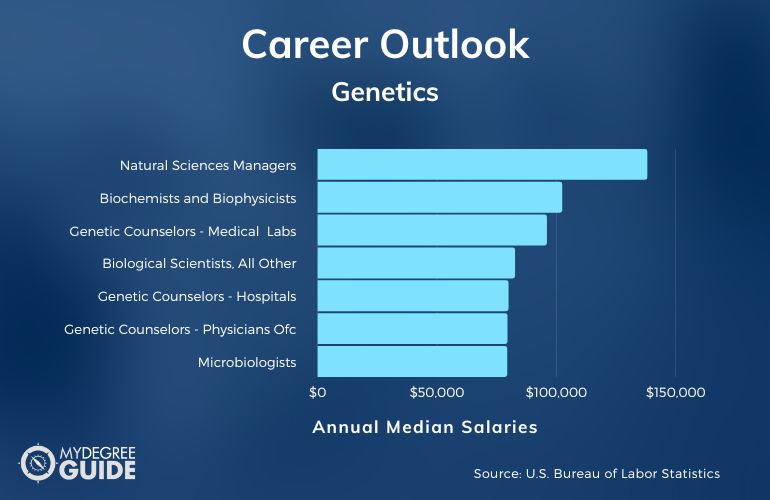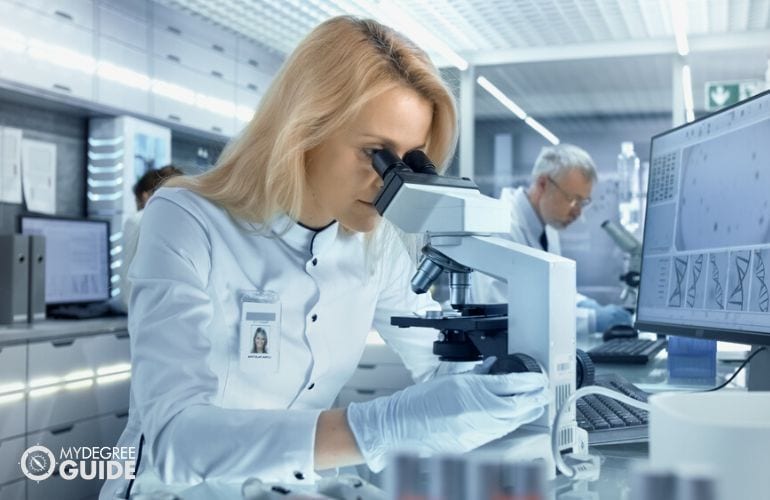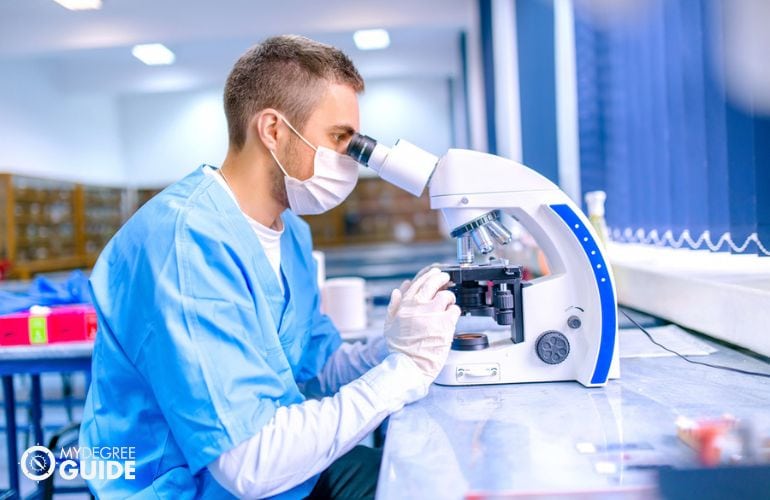A masters in genetics exposes students to clinical medical research and seminars that focus on how genetics affect the cells of an organism across its lifespan.

This masters degree is an interdisciplinary program that allows students to gain a robust knowledge of genetics.
Editorial Listing ShortCode:
Students who are looking to earn a master’s in genetics are likely to enter careers in the healthcare industry, from biotechnology to pharmaceuticals. It’s also common for graduates to pursue career paths in genetic counseling, education, and research.
Universities Offering Online Masters in Genetics Degree Programs
Methodology: The following school list is in alphabetical order. To be included, a college or university must be regionally accredited and offer degree programs online or in a hybrid format.
1. Bay Path University
Bay Path University offers a Master of Science in Genetic Counseling program mostly online but with 1 on-campus weekend session each year. The program requires the completion of 59 credits, and new courses usually begin every September. The completion of 800 hours of fieldwork is also required. Clinical sites are available around the US, so a placement for these can typically be found in a convenient, local location.
Bay Path University is accredited by the New England Commission of Higher Education.
2. Boise State University
Boise State University offers a Master of Science in Genetic Counseling program online but in a highly interactive format. The opportunity to participate in clinical rotations may also be available in addition to coursework. The program is designed to be completed over 21 months, or 5 semesters. It requires 56 credit hours and usually includes a scholarly project.
Boise State University is accredited by the Northwest Commission on Colleges and Universities.
3. George Washington University
George Washington University offers an online Master of Science in Health Science program with a concentration in Medical Diagnostic Science. Completion of the program may offer qualification to sit for the ASCP Molecular Biology exam within 2 years. The program requires no campus visits, and clinical lab experience may allow for an exemption from practicum requirements.
George Washington University is accredited by the Middle States Commission on Higher Education.
4. Johns Hopkins University
Johns Hopkins University offers an MS in Individualized Genomics and Health online program with a variety of concentrations, including Genomics, Laboratory Diagnostics, and Regulatory. The program requires 9 core courses and 1 elective course and usually takes 1 to 2 years to complete. Potential courses include Human Molecular Genetics, Genes and Disease, and Genomic and Personalized Medicine.
Johns Hopkins University is accredited by the Middle States Commission on Higher Education.
5. Manchester University
Manchester University offers an online MS in Pharmacogenomics program. The program requires the completion of 34 credit hours and can typically be finished in about 2 years. Potential courses include Human Genetics, Research Responsibility and Ethics, and Advanced Molecular Biology. Courses are usually 7 weeks long.
Manchester University is accredited by the Higher Learning Commission.
6. Northern Michigan University
Northern Michigan University offers an MS in Clinical Molecular Diagnostics program in a flexible, mostly online format designed with working professionals in mind. A thesis option is usually available, in which a week-long lab experience may be required, but coursework can typically be completed entirely online.
Northern Michigan University is accredited by the Higher Learning Commission.
7. Saint Joseph’s University
Saint Joseph’s University offers an online MS in Genomics program. The program includes 8 week courses such as Introduction to Genomics, Genetic Concepts Testing, Chromosomes and Human Disease, and Cancer Genomics and Applications. Courses are typically taught in an asynchronous format, and labs are also offered virtually. The program usually takes 2 years to complete.
Saint Joseph’s University is accredited by the Middle States Commission on Higher Education.
8. Southern California University of Health Sciences
The Southern California University of Health Sciences offers a Master of Science in Human Genetics and Genomics online program. The full-time option typically takes 1 year to complete, and the part-time option usually takes 2 years. The program usually requires a capstone project, which applies learning to real-world situations.
Southern California University of Health Sciences is accredited by WASC Senior College and University Commission.
9. Texas A&M University – Commerce
Texas A&M University–Commerce offers an online Master of Science in Biological Sciences program that may be finished in 2 to 3 years. The opportunity to study both research and practical applications is offered, and internships are often available but not required. Potential courses include Molecular Genetics, Ecological Genetics, Medical Microbiology, and Pharmacology.
Texas A&M University-Commerce is accredited by the Southern Association of Colleges and Schools Commission on Colleges.
10. Tufts University
Tufts University offers an MS in Functional Genomics program online. Courses potentially include Molecular Biotechnology, Advanced Genomics and Genome Editing, and Biochemistry and Cellular Metabolism. The part-time program typically offers classes on a trimester calendar and is designed to be completed in 2 years or less.
Tufts University is accredited by the New England Association of Schools and Colleges.
11. University of Cincinnati
The University of Cincinnati offers a Master of Science in Pharmaceutical Sciences online program with a specialization in Pharmacogenomics and Personalized Healthcare. The program is designed to be highly customizable and typically requires no campus visits. There are multiple start dates every year, and the program may be completed in 2 years of part-time study.
The University of Cincinnati is accredited by the Higher Learning Commission.
12. University of Connecticut
The University of Connecticut offers a Master of Science in Health Care Genetics program. Most classes are taught online, but others are often offered on campus. Completion of the program may result in credentialing from the Association for Clinical Pathology. Individualized plans of study and the opportunity to participate in an internship and professional skills development may be available through the program.
The University of Connecticut is accredited by the New England Commission of Higher Education.
13. University of Florida
The University of Florida offers an online Master of Science in Microbiology and Cell Science program with a concentration in Medical Microbiology and Biochemistry. The program requires the completion of 30 credits, and can potentially be completed in 12 months. Classes are typically taught in an asynchronous format, and campus visits are usually not required.
The University of Florida is accredited by the Southern Association of Colleges and Schools Commission on Colleges.
Online Masters in Genetics Programs

A master’s in genetics program teaches you about how genes contribute to and affect an organism’s health and traits throughout its lifespan.
To qualify for admission into this type of program, it may be necessary to hold a bachelor’s degree in a related field. A masters program in genetics is highly technical, so you’ll study complex topics with an in-depth focus. Because of this, you’ll have the opportunity to improve your research skills.
The knowledge and skills you acquire from this program could aid in your professional development. Because of the interdisciplinary approach of these programs, you may study:
- Molecular biology
- Cellular Biology
- Environmental genetics
- Evolutionary genetics
- Genomics
Because there are various genetics graduate programs, all with their own specific focus, students have the chance to choose a program that fits their research interests. Some of these specialized subjects include, but are not limited to, genomics, cancer genetics, and bioinformatics.
Some genetics students may focus on genetic counseling, human genetics, or genetics and genomics. As such, it’s common for graduates to enter careers in industries like:
- Pharmaceuticals
- Education
- Government research
- Biotechnology
Additionally, it’s common for graduates to choose to continue their education, as these programs can help prepare you for doctoral studies or medical school.
Genetics Careers and Salaries

A masters in genetics program provides students with the opportunity to deepen their knowledge and practical skills within this growing field.
One key aspect of these programs is that they allow students to pursue an assortment of career opportunities. For instance, many students take their degree and become researchers who work in labs or for governmental agencies. Others may go on to become genetic counselors who work with patients in a clinic.
According to the Bureau of Labor Statistics, here are the median wages of positions related to the study of genetics.
| Careers | Annual Median Salaries |
| Natural Sciences Managers | $137,900 |
| Biochemists and Biophysicists | $102,270 |
| Genetic Counselors — Medical and Diagnostic Labs | $95,870 |
| Biological Scientists, All Other | $82,530 |
| Genetic Counselors — Hospitals | $79,810 |
| Genetic Counselors — Offices of Physicians | $79,360 |
| Microbiologists | $79,260 |
| Genetic Counselors — Postsecondary Schools | $79,100 |
| Epidemiologists | $78,830 |
| Health Education Specialists | $60,600 |
While this degree cannot guarantee specific positions or salaries, it can help you advance your professional skill sets and qualifications.
Upon graduation, students should be able to critically apply theories, conduct research, demonstrate their oral and written skills, and demonstrate their skills at a high level. Because of this, students find themselves prepared for various fields. Some graduates use their genetic masters degree to pursue doctoral studies or medical school.
MS in Genetics Curriculum & Courses

The curricula of genetics masters programs will vary depending on the type of program you choose. That said, here are some courses you may encounter in your studies:
- Advanced Genetics and Genomics: In this course, you’ll study molecular genetics and the regulation of gene expression.
- Mechanisms of Disease: You’ll study pathophysiology, including embryological development.
- Introduction to Genetic Counseling: This course provides a survey of the history of genetic counseling.
- Reproductive and Developmental Genetics: You’ll study various aspects of reproductive genetics, including human development and teratogenic factors that affect it.
- Cancer Genetics: You’ll learn about cancer genetics, including cancer biology and clinical oncology.
- Molecular Genetics: This course teaches you about how the genome is expressed through its transcription into RNA.
- Molecular Basis of Human Genetic Disease: In this course, you’ll study topics like human genomic variation, the design and interpretation of experiments, and how discoveries are used in a clinic.
- Basic Concepts in Population and Statistical Genetics: In this course, you’ll study both the concepts and analytic methods used to assess differences in human populations.
- Computational Genomics: In this course, you’ll study both the theory and practice of genomic data analysis.
- Neurobiology of Developmental Disorders: You’ll study the molecular and cellular aspects of mammalian developmental neurobiology.
Of course, your curriculum will vary depending on your program. It may help to review the curriculum of prospective programs to ensure the material aligns with your interests.
Admissions Requirements

Genetics master’s programs have a series of admissions criteria for students to meet in order to be accepted. Here are some general admissions requirements:
- Personal statement
- Three letters of recommendation
- Completion of foundational courses in biology, mathematics, chemistry, and physics
- Bachelor’s or graduate degree in a related field
These admission requirements are likely to vary by school and program, so it’s beneficial to research your prospective school’s specific criteria before applying.
Accreditation

Attending a regionally accredited university can be a strategic way to make the most of your education. A school can receive regional accreditation when it passes a series of evaluations that attest to its standard of education.
Students who attend an accredited university are more likely to receive a high-quality education, which can benefit them in their future careers. Additionally, an accredited degree may be attractive to employers because it demonstrates your ability to perform at a high level.
Financial Aid and Scholarships

Many graduate students require the assistance of financial aid to help them meet the cost of their education. For many, the primary source of aid is federal aid administered by the government. You can apply for student loans, work-study programs, and other forms of need-based aid by filling out the Free Application for Federal Student Aid (FAFSA).
Other viable sources of aid include scholarships and grants. These are often offered by schools, professional organizations, and private institutions. Scholarship programs can each have specific application requirements. If you’re currently employed, you can also see if your employer has any professional development or tuition reimbursement programs in place for workers furthering their education.
What Is a Genetics Masters Degree?

A genetics masters degree is designed to teach students about genetics and their effect on an organism. There are different types of genetics graduate programs, some of which may focus on different facets of genetics to prepare you for specific industries.
The field of genetics is wide and diverse, so there are often many types of programs to choose from. For instance, you could choose from concentrations like general genetics, genetic counseling, or human genetics. Since a masters program in genetics allows you to specialize in a niche within the field, the program you choose could also influence your career trajectory.
Is Genetics a Good Career Choice?

Yes, genetics is a good career choice for many professionals. The interdisciplinary approach of a genetic masters program can help you prepare for a variety of positions and industries. Many graduates become genetics counselors, research scientists, and lab managers.
According to the Bureau of Labor Statistics, $80,150 is the median salary for genetic counselors, and $137,900 is the median for natural sciences managers. A masters in genetics may help you qualify for entry-level positions in biochemistry and biophysics. The median annual wage for biochemists and biophysicists is $102,270. In addition to scientific fields, genetics professionals can also work in healthcare and education.
A number of universities now offer on-campus and online masters in biomedical informatics and biochemistry degree online programs.
What Can I Do with a Masters in Genetics?

A masters in genetics may help you qualify for various career paths. Because these programs take an interdisciplinary approach, graduates are often prepared to enter fields like research, education, and healthcare.
Many graduates go on to work for government agencies, medical centers, and labs. It’s also common for these graduates to specialize in a niche within the genetics field. Some popular specialty areas include animal genetics, crop genetics, biopharmaceuticals, and food manufacturing. Another option for many graduates is to become genetic counselors or health educators.
How Long Does It Take to Get a Masters in Genetics Online?

Genetics masters programs generally take between 1 to 2 years to complete if students enroll full-time. If you were to enroll in the program part-time, then you could expect that it would take longer to complete.
Online master’s in genetics programs may also allow for more flexibility, meaning students can better tailor their schedules to their needs. If a masters program only requires 36 credit hours or less, you may be able to finish it in 1 year with year-round study, including during the summer. A thesis component could extend your time to completion, though.
What’s the Difference Between Genomics vs. Genetics?
Genomics and genetics are two different disciplines that are closely related.
| Genomics | Genetics |
|
|
Understanding these differences can help you choose the area of study that aligns with your career goals.
Is a Master’s Degree in Genetics Worth It?

Yes, a master’s degree in genetics is worth it for many professionals. There are a variety of genetics graduate programs that offer differing specialization tracks. You could choose the degree track that fits your interests and preferred career path.
Some genetics professionals choose to go into healthcare and genetic counseling, while others pursue positions in scientific research or education. Careers related to the field of genetics are also projected to see continued job growth. For example, the employment of genetic counselors is expected to grow by 18% over the next ten years, which is much faster than average (Bureau of Labor Statistics).
Getting Your Masters Degree in Genetics Online

Much like other online biology degree programs, an online masters in genetics program can let you develop your expertise and grow your skill sets in the field of genetics. Online programming may also offer additional flexibility to your academic schedule.
It’s common for genetics graduate programs to provide different specialization tracks. For instance, some programs focus on genetic counseling, while others focus on research in the field. Those interested in becoming medical scientists or practitioners may use their masters as a stepping stone toward PhD studies or medical school.
You can begin researching accredited universities today to discover which genetics masters programs and specializations align with your professional goals.
